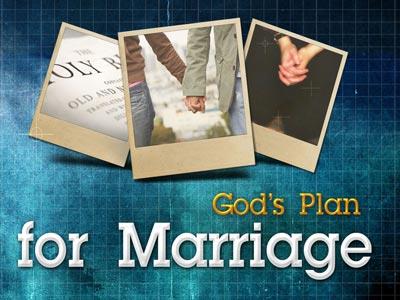-
The Institution Of Marriage
Contributed by David Smith on Jan 29, 2007 (message contributor)
Summary: ’Love and marriage, love and marriage, go together like horse and carriage’. So we’re told, but not in my book they don’t, and by ’my book’ I mean the Bible.
’Love and marriage, love and marriage, go together like horse and carriage’. So we’re told, but not in my book they don’t, and by ’my book’ I mean the Bible.
That’s a warm and inviting way to start a sermon, isn’t it? But the tone is set for us today by our reading from the Old Testament - the story about the family of Elkanah. It’s a story that functions primarily to set the scene for the emergence of the Samuel, the last of the great judges and the first of the king-makers, but it’s also a story that gives us a fruitful basis, I believe, to begin to think Biblically about the institution of marriage.
Now I recognise that I’m not likely to make any friends by focusing upon this topic today. If you’re not married (and about half of us at Holy Trinity are not) you probably didn’t turn up here this morning so that you could be reminded of what you’re missing out on in life. And if you are married with a family, I recognise that it is quite possible that you come to church (in part at least) to escape, in a little way, the daily pressures of marriage and family, and therefore that it’s the last thing you want to be forced to focus upon, in this your period of spiritual respite.
And after all, which one of us married men really wants to undergo the scrutiny of being compared to a good man like Elkanah - a loving husband and, no doubt, a good father. Elkanah and Hannah make a lovely couple, though of course they’re not really a couple? They’re a triple! Hannah is married to Elkanah, who is also married to the fruitful Penninah!
I don’t know if they used to use language like that in those days - "don’t they make a lovely triple". My wife is of the opinion that there’s no such thing as a lovely triple - that while the men might have enjoyed it, the women would undoubtedly have had a hard time.
The case in point would certainly seem to bear out this analysis, as the two women of Elkanah’s household do not appear to get on too well at all. As Ange depicted it, you have the one woman saying to the other ’ha, ha, you don’t have any children’ and the other one responding with ’ha, ha, Elkanah doesn’t really love you.’
Scripture is indeed filled with sad stories associated with multi-partner marriages.
Go back in Scripture a little way and you’ll find the unhappy story of Jacob, and all the drama associated with his marriage to the two daughters of Laban - Rachel and Leah. Jacob of course also had children to both his wives’ maidservants, resulting in such a tension between the children of the different mothers that, in the end, the sons of the various mothers gang up and try to lynch the only son of Rachel - Joseph.
Go back further still and you’ll find the story of Abraham and his wife Sarah and her maidservant Hagar, who becomes Abraham’s mistress of sorts, and ends up being sent off into the desert by Sarah to die, along with the son that Hagar bore to Abraham.
Move forward from this story in the first book of Samuel and you’ll hit all the problems that King David had with his multiple partners and their children who raped, murdered and went to war with each other!
And then you have Solomon and his multiple partnerships, which were generally recognised as being the beginning of the end of the United Kingdom of Israel!
The Biblical record of success in multi-partner marriages is not terrific. And the relationship that we have on view this morning is indeed another case in point. It is a sad opening scene, and Hannah is the saddest of the three key figures. She is teased by Penninah, gets the smaller portions of food from her husband Elkanah, and then finally gets picked upon by Eli the priest who accuses her of drunkenness - all problems, we might like to suggest, that arise out of Elkanah’s decision to have two wives!
Mind you, the traditional Arab solution to this sort of dilemma was to have four wives. They agreed that two partners would always be at each other’s throats. Introduce a third and the situation gets worse, as two gang up against one. But with four wives, they pair up in friendship and support each other and everybody gets on just fine. So says traditional Middle Eastern wisdom (and I take no responsibility for the development of this theory whatsoever).
’Bloody men’ I hear some of you quietly say under your breath (and some not so quietly). And this is always the reaction I hear when I reflect on passages such as this in the presence of women. The assumption of course is that the whole concept of the multi-partner marriage was a male idea, aimed at satisfying the wanton cravings of men. We are looking at a patriarchal society where men call all the shots, and so they institutionalise a form of marriage that satisfies their own wants and need at the expense of their women folk - so the dialogue goes.

 Sermon Central
Sermon Central



